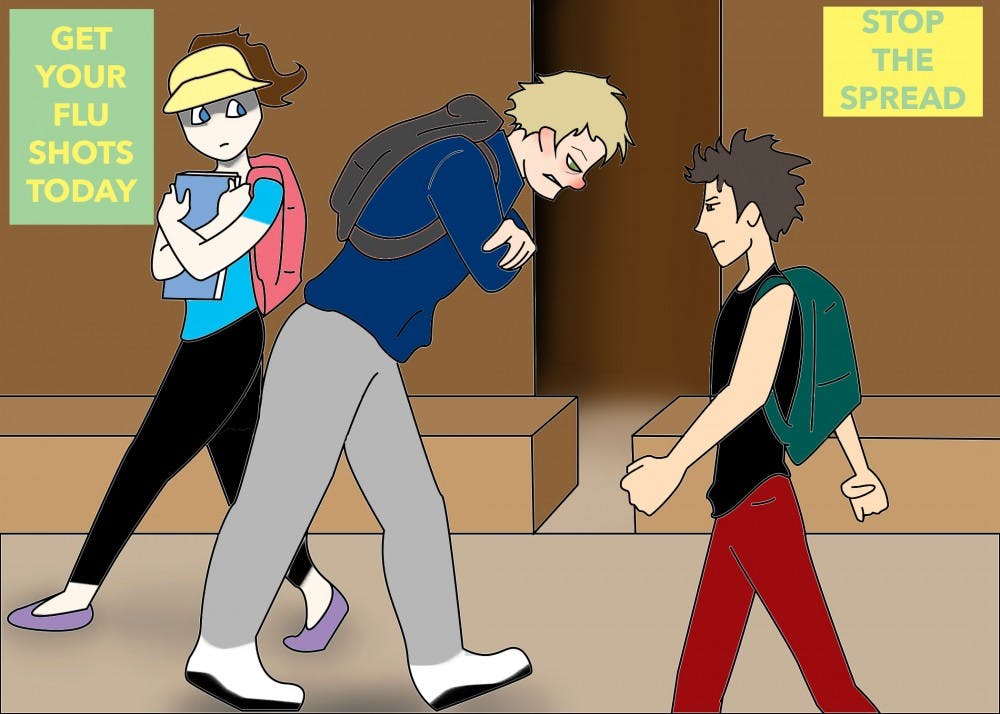The tragedy of the fall semester is that midterms coincide directly with the beginning of flu season.
Although there is no doubt that class attendance is crucial, showing up to class while sick is a double-edged sword as the flu is highly contagious.
During this time, students' stress can skyrocket to high levels, leaving them vulnerable — a perfect climate for an illness to strike.
Coincidentally, when temperatures decline, airborne germs are more likely to spread. Students may not recognize the early symptoms of the flu, which according to Mayo Clinic, includes coughing, a high fever, headaches, fatigue and a sore throat.
According to the Centers for Disease Control and Prevention (CDC), flu season begins in October and begins to subside around February. Relative to the academic calendar, this spans both midterms and finals in the fall semester.
Public health is always a concern, especially on densely-populated college campuses such as ASU. As of Fall 2016, there were nearly 52,000 students at the Tempe campus alone – the college might as well be a town of its own. The easiest preventative measure students can take is getting the flu vaccine as early as possible in the season.
ASU does offer flu clinics at each of its campuses. Yet, the largest campus, Tempe, is the last to begin offering the vaccine, with all of the clinics being held in late October. The Polytechnic and West campuses have clinics beginning as early as late September.
This is done, however, with very little campaigning to advocate immunizations. Thus far, there appear to be no signs around the Tempe campus regarding when the flu shot will be available and where students could go to receive one.
In addition, students often overlook the necessity of getting the flu shot.
Alexandra Bhatti, a public health analyst and staff attorney in the Public Health Law Program at the Centers for Disease Control and Prevention, offered a reason for this.
“Most of the vaccinations you need, you get when you’re younger and there is attention paid to vulnerable adults, but we often forget about adults in between,” Bhatti said. “There are still vaccinations that you may need and I’m not sure we do a good enough job as we can at sending that message.”
The particular strain of influenza that plagues society changes on a year-to-year basis, which means that students should make a concerted effort to get a flu shot each year.
However, other factors such as mental health play a strong role in immunity.
Stress has a great impact on students behavioral health.
“Physical health and mental health have to coincide, so if you're lacking in one area, you will lack in the other – there's definitely a correlation,” Angela Giles, ASU faculty associate for the College of Health Solutions and a collaborative care clinician at the Veterans Administration, said.
As midterm assignments and exams stack up, many students begin to feel anxious about their academic performance and how to pass their courses successfully. This stress can have negative effects on their health and wellness.
Christy Lespron, an associate professor in the School of Nutrition and Health Promotion, said that poor nutrition and lack of proper vitamins is often a trend for students, especially freshmen.
“One of the biggest things students can do to get their immune system in a good place is follow mom’s advice and eat fruits and vegetables, not only in terms of antioxidants, but plant foods have phytochemicals which are beneficial compounds which protect the plant as well as the cells of your body,” Lespron said.
ASU has plenty of resources for students to practice mindfulness and wellness, which can help clear their mind of stress and anxiety. Students can take free group wellness classes at the Sun Devil Fitness Center, which promote health, exercise and student bonding.
Pre- and post-exam nervousness is common – students are under high pressure to perform well on the big projects and exams that make up a large portion of their grade.
As the weeks of this semester fly by and flu season approaches, students should head over to a pharmacy or clinic to get their vaccine.
Reach the columnist at nlplunke@asu.edu and kalbal@asu.edu or follow @ninalplunkett and @karishmaalbal on Twitter.
Editor’s note: The opinions presented in this column are the author’s and do not imply any endorsement from The State Press or its editors.
Want to join the conversation? Send an email to opiniondesk.statepress@gmail.com. Keep letters under 500 words and be sure to include your university affiliation. Anonymity will not be granted.
Like The State Press on Facebook and follow @statepress on Twitter.





